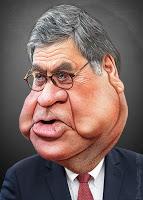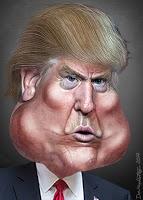
 (These caricatures of William Barr and Donald Trump are by DonkeyHotey.)
(These caricatures of William Barr and Donald Trump are by DonkeyHotey.)If you needed more evidence of the deep trouble that Donald Trump is in, this might be it.
Attorney General William "Whitewash Willie" Barr proved himself to be a sycophant for Trump after the Mueller Report was released -- ignoring the report's conclusions and declaring that Trump did not collude with Russia or obstruct justice. He made it clear that he was willing to lie to protect Trump.
But it seems there's a line that even Whitewash Willie won't cross. After it became known that Trump had tried to extort Ukraine by refusing to release military aid (passed by Congress) until the Ukrainian president announced they would be investigating Joe Biden and his son, Trump asked Barr to hold a news conference and say that Trump had not broken any laws.
Barr did not hold that news conference. Instead, the Justice Department released a tepid statement saying no action was needed. That was shocking. If Barr won't say Trump didn't break the law, then you can be sure that laws were definitely broken!
Here's what Steve Benen said about this on The MaddowBlog:
When Donald Trump is in a jam, one of his first instincts is to look for a fixer who can help make his problem go away. And in late September, the president found himself in a jam. Evidence of his extortion scheme with Ukraine was reaching the public, and the White House’s decision to release a call summary of Trump’s conversation with Ukrainian President Volodymyr Zelensky backfired: it was more incriminating than the Republican realized, pushing the scandal to a new level. It was at this point that Trump turned to his attorney general to fix his problem. As the Washington Postreported overnight, that did not go well.
President Trump wanted Attorney General William P. Barr to hold a news conference declaring that the commander in chief had broken no laws during a phone call in which he pressed his Ukrainian counterpart to investigate a political rival, though Barr ultimately declined to do so, people familiar with the matter said. The request from Trump traveled from the president to other White House officials and eventually to the Justice Department.According to the Post’s reporting, Trump didn’t just move on after Barr demurred: the president mentioned it to others, saying he wished the attorney general would publicly exonerate him. Trump, not surprisingly, has denied the accuracy of the report, calling it “fake news.” That said, the New York Times ran a similar article overnight, confirming the story. (MSNBC and NBC News have not yet independently verified the reporting.) The idea that the president would make such a request is very easy to believe. Indeed, we’ve seen similar dynamics before, including Trump’s 2017 efforts to pressure then-FBI Director James Comey into telling the public that he wasn’t facing a federal criminal investigation as scrutiny of the Russia scandal intensified. It’s equally easy to imagine that if Barr had complied with the presidential request, it wouldn’t have made much of a difference: the attorney general is already seen as a toadying Trump loyalist, so if he publicly exonerated his boss, few would’ve taken his rhetoric seriously. What I find most interesting, however, is the apparent fact that Barr said no. We are, after all, talking about an attorney general who’s been willing to embarrass himself and his country by traveling the world, looking for evidence to substantiate ridiculous Trump conspiracy theories. He’s the same attorney general who held a cringe-worthy press conference earlier this year, pre-spinning the Mueller Report in ways intended to be politically beneficial for the White House. And more to the point, this is also the same attorney general whose Justice Department ignored referrals related to the Ukraine scandal. With that in mind, if we assume that the latest reporting is true, it’s hard not to wonder why, exactly, Barr didn’t simply say, “Yes, sir” after hearing of Trump’s appeal. Maybe the attorney general didn’t want to appear even more ridiculous? Maybe he saw value in trying to place some distance between himself and the impeachment scandal? Or maybe he has reason to believe the president can’t actually be exonerated from criminal wrongdoing?

